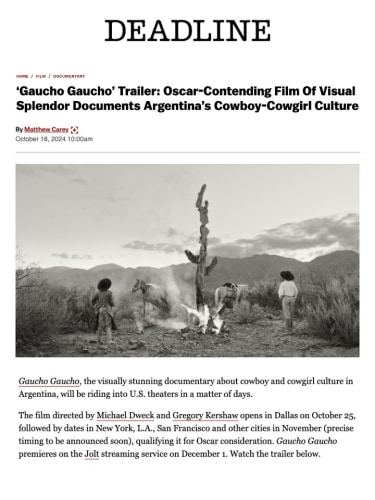‘Gaucho Gaucho’ Trailer: Oscar-Contending Film Of Visual Splendor Documents Argentina’s Cowboy-Cowgirl Culture
Deadline
10/18/2024
Back
By Matthew Carey
Gaucho Gaucho, the visually stunning documentary about cowboy and cowgirl culture in Argentina, will be riding into U.S. theaters in a matter of days.
The film directed by Michael Dweck and Gregory Kershaw opens in Dallas on October 25, followed by dates in New York, L.A., San Francisco and other cities in November (precise timing to be announced soon), qualifying it for Oscar consideration. Gaucho Gaucho premieres on the Jolt streaming service on December 1. Watch the trailer below.
“Gaucho Gaucho paints an Argentinian Western with image and sound that reach an operatic beauty,” notes a synopsis. “Acclaimed photographers and now three-time Sundance-fêted filmmakers Gregory Kershaw and Michael Dweck return with another striking nonfiction work after first taking audiences to the final stock car racetrack of Long Island with The Last Race and the secret corners of the Italian countryside in search of white truffles with The Truffle Hunters. Their focus is now on the vast mountains of Argentina, expressed in stunning black-and-white photography, and a small community of gauchos who hold profound connections to the surrounding nature and their own traditions. As older generations dispense their wisdom, the film keeps its eye toward a new generation who continue to fight for their families’ legacy in a modern world.”
The documentary, filmed in evocative black and white, contains scenes where the camera seems to glide right alongside kids on horseback galloping at a furious pace.
“What we wanted to do is figure out a way to bring that experience to the audience, to have them feel this incredible connection between human and animal,” Kershaw explained in an interview with Deadline at the Sundance Film Festival, where Gaucho Gaucho premiered in U.S. Documentary Competition. “And as you see in the film, we did these tracking shots. We ended up bringing a camera car across the country, 25 hours up to these mountaintop locations we were filming so we could be going at the same speed as the horses going through these vast landscapes. We had a lot of flat tires with cactus popping the air from tires. But the hope is that when you see these scenes, you’re transported, and you feel what it’s like to be on a horse going through wilderness.”
Gaucho Gaucho, winner of awards at Sundance and the Locarno Film Festival in Switzerland, is a film about the durability of tradition in one part of the globe. But the prospect of transformation hovers over the community of gauchos due to factors beyond their control.
“Climate [change], of course, is a challenge for them,” Dweck noted. “It hasn’t rained in quite a bit, so they have to learn how to adapt. We have an impact program that we’re going to help with after the film is done. We did the same with The Truffle Hunters — we actually raised quite a bit of money to preserve the land that’s there [in the Piedmont region of Italy]. So that kind of helped to preserve the culture. I think the same thing we’re going to end up doing with this one as well, to help in some way.”
In the interview from Sundance with Deadline, Kershaw shed light on the meaning of the film’s title.
“To be ‘gaucho gaucho’ is different than just being a gaucho,” he said. “To be ‘gaucho gaucho’ means you’re a true gaucho. You live by the traditions, you uphold the honor, you dress like a gaucho. The songs, the dance. And what we found through the filming is that to be ‘gaucho gaucho’ is really to hold onto this idea of freedom. And that really became sort of the guiding light for the film. It was an exploration of freedom, what it means to be free, the cost of freedom, and the joy and beauty that you can live if you find it.”
Impact Partners presents a Beautiful Stories production, in association with Foothill Productions Bayard Productions, Diorama Media, Faliro House Productions, and Grazka Taylor Productions. Gaucho Gaucho is directed Michael Dweck and Gregory Kershaw, who also serve as the film’s cinematographers. The documentary is produced by Dweck, Kershaw, Cameron O’Reilly, Christos V. Konstantakopoulos, and Matthew Perniciaro.
Executive producers include Jamie Wolf, Nathalie Seaver, Jenny Raskin, Geralyn White Dreyfous, Jim and Susan Swartz, Grazka Taylor, Meadow Fund, Adam and Melony Lewis, Regina K. Scully, Laszlo and Emily Bock, Nina and David Fialkow, Andreas Zoupanos Kritikos, Shari Sant, Jake Stern, and Max Stern.
Gabriel Rhodes edited the film; sound design is by Stephen Urata.
The mission of Jolt, the streaming platform that will premiere the documentary on December 1, is to capture “relevant new audiences for extraordinary new independent films. The Jolt platform engages audiences directly on a global scale, helping great films achieve their full potential for reach and monetization while filmmakers retain ownership, data, and all future rights.”